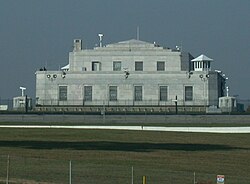United States Bullion Depository
|
US Bullion Depository, Fort Knox, Kentucky
|
|

The United States Bullion Depository
|
|
| Location | Gold Vault Rd. and Bullion Blvd., Fort Knox, Kentucky |
|---|---|
| Area | 42 acres (17 ha) |
| Built by | Great Lakes Construction Co. |
| Architect | Louis A. Simon |
| Architectural style | Classical Revival |
| NRHP Reference # | 88000056 |
| Added to NRHP | February 18, 1988 |
Coordinates: 37°53′00″N 85°57′55″W / 37.8832°N 85.96525°W
The United States Bullion Depository, often known as Fort Knox, is a fortified vault building located within the United States Army post of Fort Knox, Kentucky, used to store a large portion of United States official gold reserves and occasionally other precious items belonging or entrusted to the federal government. It is estimated to have roughly 2.3% of all the gold ever refined throughout human history.
In 1933, U.S. President Franklin D. Roosevelt issued Executive Order 6102, which outlawed the private ownership of gold coins, gold bullion, and gold certificates by American citizens, forcing them to sell these to the Federal Reserve. As a result, the value of the gold held by the Federal Reserve increased from $4 billion to $12 billion between 1933 and 1937. This left the federal government with a large gold reserve and no place to store it. In 1936, the U.S. Treasury Department began construction of the United States Bullion Depository at Fort Knox, Kentucky, on land transferred from the military. The Gold Vault was completed in December 1936 for US $560,000. The site is located on what is now Bullion Boulevard at the intersection of Gold Vault Road. The building was listed on the National Register of Historic Places in 1988, in recognition of its significance in the economic history of the United States and its status as a well-known landmark. It is constructed of granite mined at the North Carolina Granite Corporation Quarry Complex.
...
Wikipedia


